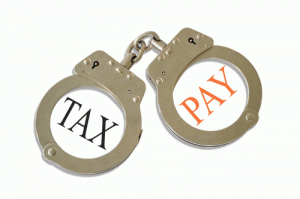Is Prosecution the Best Deterrance for Tax Evasion?
 An interesting issue at present is whether criminal prosecution is an effective deterrence for tax evasion in India. Does the Government actually consider that prosecution of tax evaders is an effective tool for prohibiting people from accumulating black money?
An interesting issue at present is whether criminal prosecution is an effective deterrence for tax evasion in India. Does the Government actually consider that prosecution of tax evaders is an effective tool for prohibiting people from accumulating black money?
The current opinion is that Tax systems should have moderate rate of taxation, simple process, and high cost of evasion as deterrence against non-compliance. If any concealed income is detected, punishment should be in the form of monetary penalties and criminal prosecution.
Offences under the Income Tax Act:
Various offences are liable for criminal prosecution according to the Income Tax Act. These comprise non-filing of returns, concealment of income, misappropriation of funds gathered from tax deducted at source, etc.
These offences have been modified regularly to make the provisions effective. The offences like concealment of income, making false statements, non-deposit of tax deducted etc. are punishable with higher level of punishments, whereas offences like non-filing of returns etc. are punishable with lower level of punishments.
Prolonged trial:
Everyone knows that trial of these proceedings remain pending in courts for a long period of time. In India the average duration of a criminal trial for prosecutions instituted under the Income tax Act is more than 12 years.
The main reasons for this delay are complicated procedures, heavy work pressure of courts, adjournments due to absence of the accused or the department or their counsels, or witnesses, etc.
The accused persons often adopt dilatory practices so that it becomes difficult for the department to produce witnesses and documents. Again applications for revision and stay are filed in the higher courts which again delay the procedure.
The judicial process has become very much time consuming. When a case is ready for hearing before the court, sometimes the records cannot be traced. Many offences under the Income Tax Act are non-cognizable; so delay in the proceedings gives advantage to the tax offenders.
Low rate of conviction:
The statistics state that more than 75% cases for criminal trial do not end up in conviction. Out of 60 cases there was only one case of conviction in 2004-05 and 2005-06. Even the tenure of punishment which is awarded is hardly more than three months.
Things to be done to make the prosecution system effective:
These provisions should focus on the speed of trial, the specification of punishment and the consequences of conviction to make the prosecution system more effective.


 ITAT Amritsar: No Section 269SS Violation for One-Time Cash Payment Before Sub-Registrar
ITAT Amritsar: No Section 269SS Violation for One-Time Cash Payment Before Sub-Registrar  Tax Officials Unleash Digital Dragnet: How New Raid Powers Redefine Privacy, Property Rights in India and likely to Fuel Corruption
Tax Officials Unleash Digital Dragnet: How New Raid Powers Redefine Privacy, Property Rights in India and likely to Fuel Corruption  Income Tax Department Rewards for Reporting Tax Evasion: A Comprehensive Guide
Income Tax Department Rewards for Reporting Tax Evasion: A Comprehensive Guide  Forfeiture of Gratuity by Employer- What are the Remedies for an employee- Can employer be challenged?
Forfeiture of Gratuity by Employer- What are the Remedies for an employee- Can employer be challenged?  Employer can forfeit gratuity of an employee in case of moral turpitude
Employer can forfeit gratuity of an employee in case of moral turpitude  Diving Deeper: The Impact of the New Tax Bill on Dairy and Farming Income
Diving Deeper: The Impact of the New Tax Bill on Dairy and Farming Income